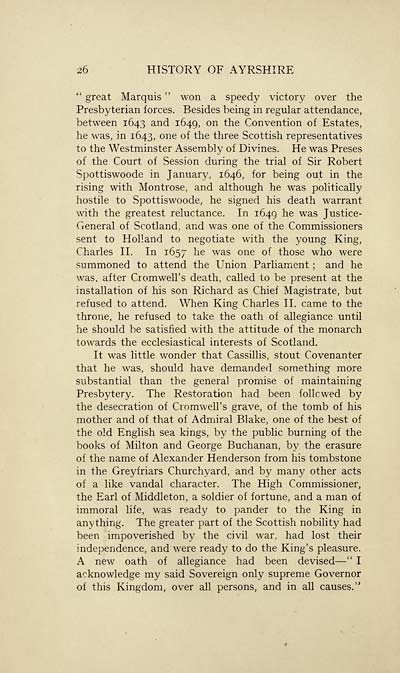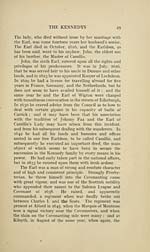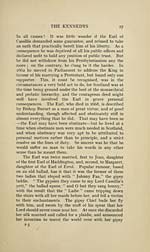Download files
Complete book:
Individual page:
Thumbnail gallery: Grid view | List view

26 HISTORY OF AYRSHIRE
" great Marquis " won a speedy victory over the
Presbyterian forces. Besides being in regular attendance,
between 1643 and 1649, on the Convention of Estates,
he was, in 1643, one of the three Scottish representatives
to the Westminster Assembly of Divines. He was Preses
of the Court of Session during the trial of Sir Robert
Spottiswoode in January, 1646, for being out in the
rising with Montrose, and although he was politically-
hostile to Spottiswoode, he signed his death warrant
with the greatest reluctance. In 1649 ne was Justice-
General of Scotland, and was one of the Commissioners
sent to Holland to negotiate with the young King,
Charles II. In 1657 ne was one °- those who were
summoned to attend the Union Parliament ; and he
was, after Cromwell's death, called to be present at the
installation of his son Richard as Chief Magistrate, but
refused to attend. When King Charles II. came to the
throne, he refused to take the oath of allegiance until
he should be satisfied with the attitude of the monarch
towards the ecclesiastical interests of Scotland.
It was little wonder that Cassillis, stout Covenanter
that he was, should have demanded something more
substantial than the general promise of maintaining
Presbytery. The Restoration had been followed by
the desecration of Cromwell's grave, of the tomb of his
mother and of that of Admiral Blake, one of the best of
the old English sea kings, by the public burning of the
books of Milton and George Buchanan, by the erasure
of the name of Alexander Henderson from his tombstone
in the Greyfriars Churchyard, and by many other acts
of a like vandal character. The High Commissioner,
the Earl of Middleton, a soldier of fortune, and a man of
immoral life, was ready to pander to the King in
anything. The greater part of the Scottish nobility had
been impoverished by the civil war, had lost their
independence, and were ready to do the King's pleasure.
A new oath of allegiance had been devised — " I
acknowledge my said Sovereign only supreme Governor
of this Kingdom, over all persons, and in all causes."
" great Marquis " won a speedy victory over the
Presbyterian forces. Besides being in regular attendance,
between 1643 and 1649, on the Convention of Estates,
he was, in 1643, one of the three Scottish representatives
to the Westminster Assembly of Divines. He was Preses
of the Court of Session during the trial of Sir Robert
Spottiswoode in January, 1646, for being out in the
rising with Montrose, and although he was politically-
hostile to Spottiswoode, he signed his death warrant
with the greatest reluctance. In 1649 ne was Justice-
General of Scotland, and was one of the Commissioners
sent to Holland to negotiate with the young King,
Charles II. In 1657 ne was one °- those who were
summoned to attend the Union Parliament ; and he
was, after Cromwell's death, called to be present at the
installation of his son Richard as Chief Magistrate, but
refused to attend. When King Charles II. came to the
throne, he refused to take the oath of allegiance until
he should be satisfied with the attitude of the monarch
towards the ecclesiastical interests of Scotland.
It was little wonder that Cassillis, stout Covenanter
that he was, should have demanded something more
substantial than the general promise of maintaining
Presbytery. The Restoration had been followed by
the desecration of Cromwell's grave, of the tomb of his
mother and of that of Admiral Blake, one of the best of
the old English sea kings, by the public burning of the
books of Milton and George Buchanan, by the erasure
of the name of Alexander Henderson from his tombstone
in the Greyfriars Churchyard, and by many other acts
of a like vandal character. The High Commissioner,
the Earl of Middleton, a soldier of fortune, and a man of
immoral life, was ready to pander to the King in
anything. The greater part of the Scottish nobility had
been impoverished by the civil war, had lost their
independence, and were ready to do the King's pleasure.
A new oath of allegiance had been devised — " I
acknowledge my said Sovereign only supreme Governor
of this Kingdom, over all persons, and in all causes."
Set display mode to:
![]() Universal Viewer |
Universal Viewer | ![]() Mirador |
Large image | Transcription
Mirador |
Large image | Transcription
Images and transcriptions on this page, including medium image downloads, may be used under the Creative Commons Attribution 4.0 International Licence unless otherwise stated. ![]()
| Histories of Scottish families > Ayrshire > Volume 2 > (36) Page 26 |
|---|
| Permanent URL | https://digital.nls.uk/95189530 |
|---|
| Attribution and copyright: |
|
|---|---|
| Description | A selection of almost 400 printed items relating to the history of Scottish families, mostly dating from the 19th and early 20th centuries. Includes memoirs, genealogies and clan histories, with a few produced by emigrant families. The earliest family history goes back to AD 916. |
|---|

